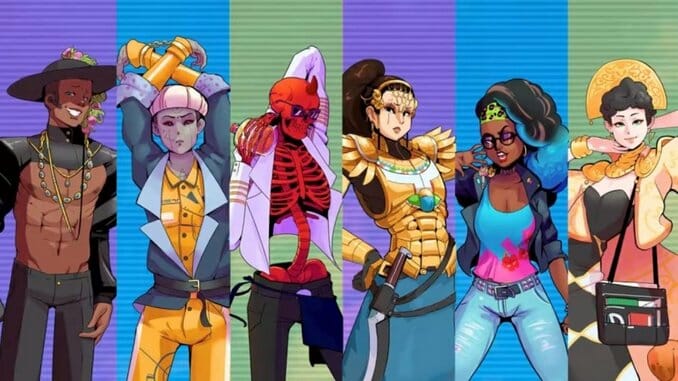
Few open-world games reward player curiosity as well as Paradise Killer. Whereas many sandbox titles offer the freedom to roam for its own sake, this game channels the player’s desire to explore into a detective process that relies on their persistence and observation. In the game, your job as investigator Lady Love Dies is to solve the murder of The Council, a secretive power group that manages The Island. In this so-called utopia, where everything is “perfect” and everyone is lying, extracting secrets is often a matter of evidence. To present the most accurate theory, you have to find enough clues and admissions to support it. However, your theories are also subject to thoroughness, as any new sliver of information can change everything. You can initiate a trial at any time you wish, but whether you can make your case logically is a matter of diligence. The chance for failure is ubiquitous, mirroring the many near-misses of a criminal investigation beautifully.
Paradise Killer is very well put together. Its funky, late ‘80s style, evoking everything from Memphis Group to art deco, is well supplemented by the game’s chunky low poly visuals. Its lore, depicting a dark world of interdimensional gods whose revival demands ritual human sacrifice, is absolutely out of control. But equally satisfying as the aesthetic and lore is the complexity of how the case unfolds. The open-world setting lends itself to a nonlinear investigation directly affected by how nosy you choose to be. The demand it places on your observation skills is aided by the art direction, in that it initially misleads the player about the game’s boundaries. If you’ve played many games from the PlayStation era, certain surfaces or inclines, though usable, feel taboo. It creates several early opportunities to miss clues and puzzles that address the plot’s more convoluted points, leaving a delicious pile of “what ifs” in its wake. What would the game have been like if I’d never hopped the ledge at the Council Building and found an open apartment window? What if I’d never climbed the roof, just because I could, and found those tire tracks? What if I’d never taken that shortcut through the beach rocks and accidentally found the bloodstained bottle? The game, in retrospect, maps a world of possibilities you almost missed.

And yet, the game’s finale fails to live up to its premise’s narrative complexity. The Island in Paradise Killer is a world that is almost drunk on moral trade-offs, built on a cycle of human sacrifice. This tension underlies every point of the investigation and courts an intriguing conversation—why revive or worship a god who does not deserve spiritual authority? Neither this question, nor the ambiguity of each character’s motivations, comes into play during the trial. Once Lady Love Dies makes her case, the guilty are executed immediately, and the characters who are spared resume their spot on The Island, remarking very little on what just occurred. For all that build-up, there’s not much else to do but leave and trigger the next Island sequence, which only begins the cycle anew, and unchallenged.
The send-off is anticlimatic given how much time we’ve spent with all the characters. The culmination of events is satisfying, especially if you’ve ticked off every question in your case log. But once the judgment comes in, there are no final words with the convicted. Perhaps this is fitting for a murder investigation. After all, once the real killer is put away, what else is there left to say? But a byproduct of the process is that, by questioning each character every time you receive new information, you become very invested in how they respond to new developments. This intimacy makes the question of how they react to the conclusion of the case intriguing. How does Akiko feel now that she’s been found out—is she humbled or defiant? Has The Witness’s faith been challenged by his conviction? Will The Architect admit her pride? Unfortunately, they’re executed before you can find out.
The quick wrap-up is especially disappointing when it comes to Sam and Lydia. Their accessory to the murder is less consequential than the other characters, and their involvement is sympathetic. You can hardly blame them for being bored with immortality. And the pressure of trying to remain ambivalent to The Island’s horrors must get tiring. In a world built on so many moral and human sacrifices, to what authority can the court lay claim anyway? Nonetheless, Sam and Lydia’s conviction is relatively black and white, and there’s no chance to negotiate on their behalf. You either tell the truth and execute them, or lie to the judge and send them to exile anyway. It’s a rather reductive conclusion in a universe whose cruelty in the quest for perfection raises so many philosophical questions. Sam and Lydia deserved a fate that spoke to their complicated motives.
Perhaps it’s the multidimensional, inter-cast entanglements that bring the expectation of closure. It reminds me a bit of Hades, a game that was also in too much of a rush to finish up. After hearing the gods’ commentary on almost everything Zagreus did, it felt so strange, once they’d finally reunited in the halls of Hades, not to revisit each of them and hear their thoughts on how things turned out. In both cases, an answer to every question isn’t necessary. But with Paradise Killer, it would have been nice to say goodbye in a way that honored the relationship I built with each character. A conclusion that does not fairly weigh the conditions of their crimes is only another of the game’s injustices.
Holly Green is the editor-at-large of Paste Games and a reporter and semiprofessional photographer. She is also the author of Fry Scores: An Unofficial Guide To Video Game Grub. You can find her work at Gamasutra, Polygon, Unwinnable, and other videogame news publications.